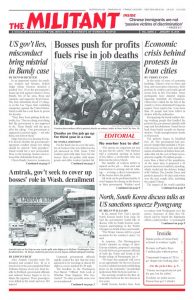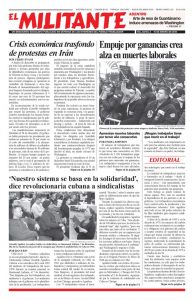NAGASAKI, Japan — The experiences of Chinese workers, peasants and merchants who have emigrated in their millions to Southeast Asia and beyond, becoming part of the class struggle and political lives of working people in many nations, was a focus of the Nov. 18-19 conference here of the International Society for the Study of Chinese Overseas.
ISSCO was launched 25 years ago to redress the near-total neglect of academic studies of Chinese immigrants around the world, co-founder Wang Gungwu, a retired professor at the National University of Singapore, told the conference. Since the society was launched in San Francisco in 1992, it has organized regular conferences in the Asia-Pacific region and the Americas, as well as Africa and Europe.
“I have fought all my life [for] studies of Chinese overseas to begin with the interests and welfare and rights of overseas Chinese in whatever country they happen to be living,” said ISSCO co-founder Ling-Chi Wang, a retired professor of Asian-American Studies at the University of California, Berkeley.
The 200 people who attended the conference at Nagasaki University included sizable numbers from universities in China, Japan, the Philippines and Indonesia. Others came from elsewhere in Asia, as well as North America, Australia and Europe.
Panels of speakers made presentations at 35 different sessions.
A number of panels addressed the impact on Chinese communities overseas of Beijing’s growing economic weight and aggressive competition. As Chinese exports grow, overseas capital investments follow, often accompanied by Chinese workers. Like Chinese immigrants in previous generations, they frequently find themselves scapegoated for the ills inflicted by the propertied rulers on working people in today’s capitalist economic and social crisis.
Charlotte Setijadi of Singapore’s Institute of Southeast Asian Studies spoke about this year’s election for governor of Jakarta, Indonesia’s capital. Islamist groups organized massive mobilizations against the sitting governor, Basuki Tjahaja Purnama, or “Ahok,” after cooking up “evidence” that he had disparaged the Koran. He is Chinese in ancestry and a Christian. The campaign not only helped prevent Ahok’s re-election, but also helped lead to his conviction and jailing under blasphemy charges.
There is a long history of government and rightist scapegoating of Chinese-Indonesians, who make up 2 percent of the 250 million people in that majority-Muslim country.
Chinese wage struggles
Chinese overseas have been anything but passive victims of discrimination, historically and today. Ya-Han Chuang of the University of Strasbourg described strikes against nonpayment of wages organized by Chinese-born women working as manicurists in Parisian salons. The women joined the CGT labor federation and in their second strike last year involved African co-workers in joint action against their employers.
Yafang Shi of Loving Sister Media in Canada reported on the “outcry by the Chinese community and others” in Toronto that put a stop to plans for release there this fall of a computer game entitled “Dirty Chinese Restaurant.” The “racist stereotypes” depicted in the game, said Shi, included “Chinese workers running from immigration officials.”
At another panel, Mary-Alice Waters, president of Pathfinder Press and a leader of the Socialist Workers Party in the U.S., spoke about the important role played by Chinese-Cuban workers, peasants and youth, in the 1959 revolution that overthrew the U.S.-backed dictatorship of Fulgencio Batista. The workers and farmers government that took power, headed by Fidel Castro, took decisive steps to defeat discrimination against both Afro-Cubans and Chinese (see accompanying article).
In his talk at a panel on the “Chinese Heritage,” Ling-Chi Wang took issue with historians’ description of 19th century Chinese immigrants in the United States as “sojourners.” The attitude that these immigrants were “here to make money and then go home” was used to rationalize brutal discrimination against them, he said, including “15 exclusion laws passed by the U.S. Congress between 1882 and 1943.”
In the closing session Wang Gungwu said that ISSCO continues to draw in new contributors. They are responding to the need to understand changes in the world that impact on Chinese overseas, including the rise of Beijing as a growing power in Asia and the world. He noted that plans are also being discussed for a regional conference next year like the one in Nagasaki and urged participants to attend the group’s next international conference scheduled for Guangzhou on the Chinese mainland in 2019.

